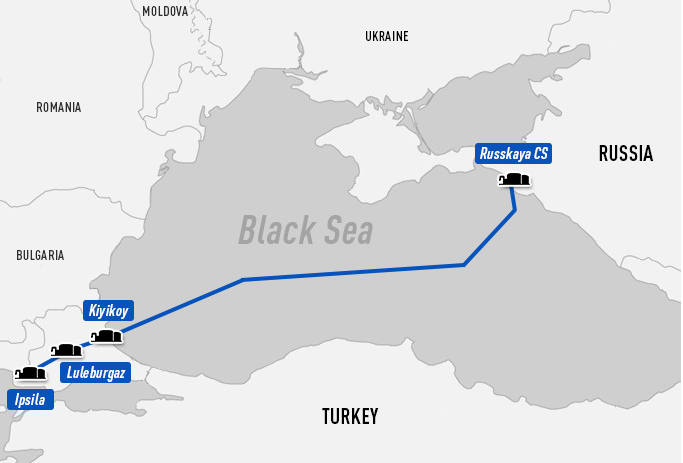Russia And Turkey Agree To Route For New Turkish Stream Pipeline Through Black Sea

ISTANBUL -- The U.S., the European Union and Russia are locked in an energy battle, and its outcome depends almost entirely on one country: Turkey. The construction of a new pipeline through the Black Sea to Turkey could tilt the balance of that game should countries such as Greece sign on to the new Russian-backed project.
At diplomatic meetings and energy conferences throughout the Middle East, Europe and Asia, Turkish officials have for the past several months promoted their country as a reliable, stable energy conduit in the region, the only one that can provide energy security in a turbulent part of the world. The Turkish government has been making the case that it is best positioned, both geographically and politically, to find a solution to Europe’s energy problem -- the continent depends largely on Russian natural-gas exports for energy, even as it is locked in a confrontation with the country over its role in the eastern Ukrainian war.
Turkey is gaining from this Western conundrum. It is participating in pipeline projects that benefit both Russia and the West.
The proposed pipeline called the Turkish Stream was catapulted into its next planning stage this week when Ankara and Moscow agreed on the route for the 700-mile pipeline, which could begin delivering oil as early as December 2016. The pipeline will run from Russia through the Black Sea to the Greece-Turkey border.
Russian state-owned energy giant Gazprom announced this week that it had reached a deal with the Turkish government on the construction of the pipeline. Gazprom is Europe’s biggest natural-gas supplier.
“We have identified and put on the map also the on-ground passage of the Turkish Stream gas pipeline for further exploration and project work,” Gazprom CEO Alexey Miller said in a statement in February.
The U.S. and its European allies are attempting to dissuade Greece and Serbia from signing on to the project as transport countries because they worry it would give Russia even greater energy dominance in the region.
“Turkish Stream doesn’t exist. There is no consortium to build it, there is no agreement to build it,” Amos J. Hochstein, U.S. special envoy for energy affairs, said after talks with Greek officials, Reuters reported Friday. The U.S. wants Greece to continue to support a pipeline it has already agreed to host -- the Trans Adriatic Pipeline, aka TAP.
“Focus on what’s important -- the pipeline we already agreed to, that Greece already agreed to,” Hochstein reportedly said.
Turkey is also a key player in TAP. Still in the planning phase, the pipeline would start at the Turkey-Greece border and extend through Greece and Albania to Italy. Once constructed, it would connect to another project, the Trans-Anatolian Pipeline, which also depends on Turkey’s cooperation and support.
The $11 billion Trans-Anatolian Pipeline would cross the entire length of Turkey’s Asian landmass. The pipeline would begin at the Georgia-Turkey border and pass to Greece through Anatolia, as Turkey’s Asian territory is known. It would not be completed until 2019.
The announcement about the Turkish Stream came after Gazprom and Turkey’s Botas Petroleum Pipeline Corp. signed a memorandum of understanding on the construction of the pipeline in December.
The Turkish Stream is the result of the cancellation of South Stream, a pipeline plan that Russia and Turkey had agreed on, but that the European Commission opposed. The executive arm of the European Union rejected Gazprom’s plans for the pipeline because it was not in line with EU laws. The pipeline would have transported Russian gas to southeastern Europe via Bulgaria, and supplied Slovenia, Serbia, Hungary and Italy with natural gas.
A Financial Times report said the Turkish Stream would deliver 16 billion cubic meters of gas a year for domestic consumption in Turkey.
The Turkish Stream would reach Turkey in the village of Kiyikoy, and the delivery hub would be close to the town of Luleburgaz, while the pipeline would terminate on the Turkish-Greek border in the area of Ipsila.

It is unclear which companies will transport the natural gas to Europe from the Greek border. Analysts say heavily indebted Greece does not have the resources available to invest in the pipeline network needed for transportation.
Russia said Friday it was considering extending funding to Greek companies that want to join the project and deliver gas to Europe. According to a Kremlin statement, Greek Prime Minister Alexis Tsipras said his country was ready to participate with a public company.
However, Serbia is not ready to participate. President Tomislav Nikolic said Friday the country would not receive gas through the pipeline.
“We have presented to all European officials our position that now we do not agree with the imposition of sanctions against Russia, but when we become a member [of the EU], we will have to conduct a common foreign policy,” Nikolic said in an interview with the news agency Interfax.
Although the Turkish Stream pipeline is in the initial stages, the European Commission could still stop its construction or prevent prospective buyers from investing in it.
EU Energy Union Vice President Maros Sefcovic said in a statement last month the best option to ensure energy security was the development of the Southern Gas Corridor, which would bring gas from Central Asia.
© Copyright IBTimes 2024. All rights reserved.





















